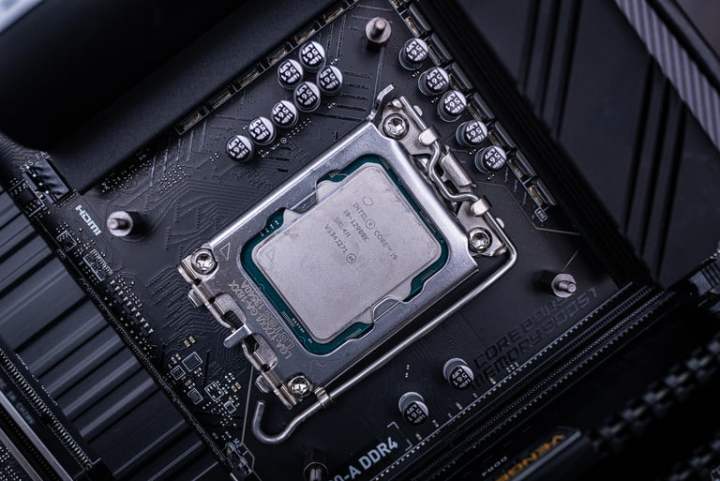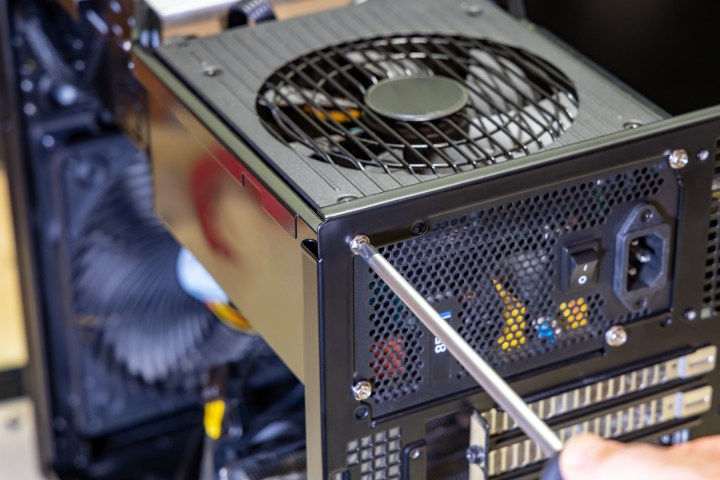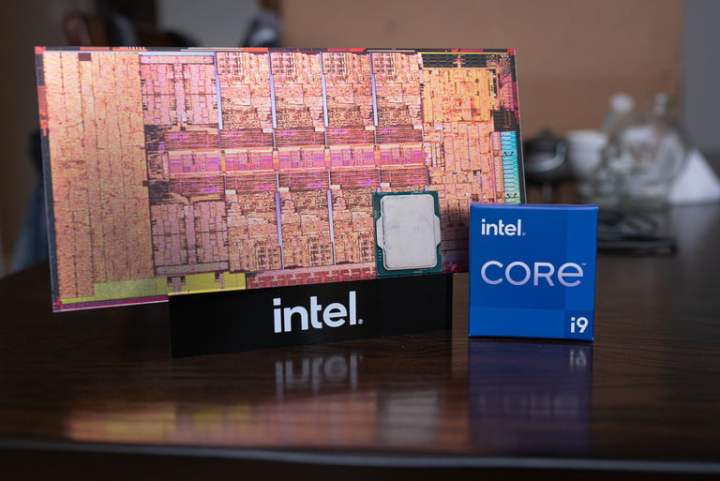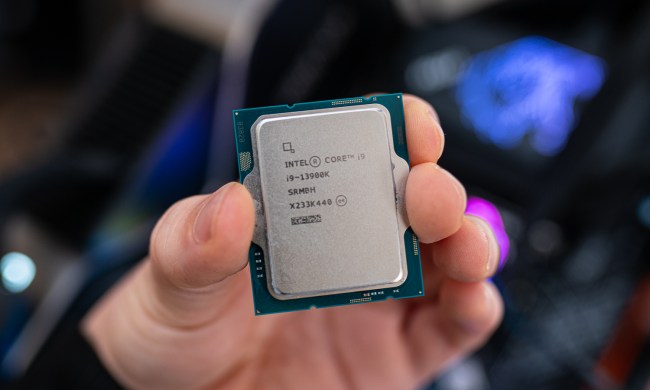Intel’s 12th-gen Alder Lake processors are ushering in a new era of desktop computing. It’s the first time we’re seeing a hybrid architecture from a slot-in CPU, and it marks a shift in leadership at Intel. Still, a big red glow hangs over Intel’s flagship Core i9-12900K — and it comes from the Ryzen 9 5950X.
Both the Core i9-12900K and Ryzen 9 5950X are 16-core processors that are top of class in their respective product ranges, and they’re among the best processors you can buy. To find out which one is better, we put both chips through a gauntlet of benchmarks and comparisons. And although there’s a lot to talk about, one chip is clearly better than the other.
If you’re looking at CPUs within a more reasonable budget, make sure to check out our Core i5-12600K versus Ryzen 5 5600X comparison, too.
Pricing and availability

The Ryzen 9 5950X and Core i9-12900K are both available now, but the Core i9-12900K is sold out at the moment. The processor just launched, so it’s naturally tough to find. Even with the chip shortage, CPUs have come back in stock quickly, so you should be able to find one within a few weeks following the November 4 release.
The Core i9-12900K has a suggested price of $589, and the Ryzen 9 5950X has a suggested price of $799. You’ll likely see the chips selling for slightly different prices, though. The Core i9-12900K is selling between $620 and $650 right now, while the Ryzen 9 5950X hovers between $750 and $800.
At most, there’s over a $200 difference between the two chips. Even taking into account sales — which usually see the Ryzen 9 5950X dropping to $720 — the Core i9-12900K is $70 cheaper (and that’s at the highest retail price we could find). The Core i9-12900K is much cheaper, no matter which way you slice it.
As should become clear as we start digging into our benchmarks, these two processors are performance competitors, but they’re not price competitors.
Specs

It’s difficult to compare the Core i9-12900K and Ryzen 9 5950X based on specs. Both are 16-core processors with similar base and boost clock speeds, but the Core i9-12900K uses a hybrid CPU architecture. The core count is the same across the two chips, but the cores themselves couldn’t be more different.
| Intel Core i9-12900K | AMD Ryzen 9 5950X | |
| Cores | 16 (8P + 8E) | 16 |
| Base Frequency | 3.2GHz (P-core), 2.4GHz (E-core) | 3.4GHz |
| Boost Frequency | 4.9GHz all-core, 5.2GHz single-core | 4.9GHz |
| L3 Cache | 30MB | 64MB |
| Base power | 125W | 105W |
| Max boost power | 241W | N/A |
The Core i9-12900K uses a hybrid architecture. Instead of 16 performant cores, it includes eight performant (P) cores and eight efficient (E) cores. The P-cores are similar to the cores inside the Ryzen 9 5950X, while the E-cores are much less powerful. These cores clean up background tasks so the P-cores can focus on more demanding workloads.
We can’t compare the cores directly, but we can compare power draw. Keeping with previous Intel generations, the Core i9-12900K can draw as much as 241 watts of power when in turbo mode. That compares to a base power draw of only 105W on the Ryzen 9 5950X, showing that AMD is still capable of delivering performant cores within a tight efficiency window.
When overclocked, the Ryzen 9 5950X can draw around 200W of power, but that’s still far below the Core i9-12900K. The Intel chip can draw closer to 300W when overclocked based on our testing. It’s a performant processor, there’s no doubt about that, but it demands one of the best power supplies on the market.
Performance

Although we can’t compare the specs of the Core i9-12900K and Ryzen 9 5950X, we can compare how they translate into performance. And across the board, the Core i9-12900K takes the crown. The tests below were run with 32GB of RAM (DDR4 on the AMD test bench and DDR5 on the Intel one) with the latest build of Windows 11.
Naturally, this configuration favors Intel. AMD chips had some problems with Windows 11 (though, they’ve been resolved since launch) and DDR5 isn’t an option for AMD right now. If you want to see the minor differences between Windows 10 and Windows 11, make sure to read our Core i9-12900K review. For DDR5, the differences are mostly insignificant, and we’ll call out any cases where it had a big impact on our final results.
| Intel Core i9-12900K | AMD Ryzen 9 5950X | |
| Cinebench R23 single-core | 1989 | 1531 |
| Cinebench R23 multi-core | 27344 | 27328 |
| Geekbench 5 single-core | 2036 | 1726 |
| Geekbench 5 multi-core | 18259 | 14239 |
| PC Mark 10 | 9092 | 8254 |
| Handbrake (seconds, lower is better) | 47 | 58 |
| Pugetbench for Premiere Pro | 1066 | 992 |
| Pugetbench for Photoshop | 1315 | 1009 |
| 7-Zip | 126215 | 139074 |
Thankfully, our first test isn’t concerned with memory speed. Cinebench is squarely focused on processor performance, and it shows the differences between the two chips clearly. The multi-core scores are identical, but the Core i9-12900K has a much higher single-core result (nearly a 30% improvement).
Geekbench cares much more about memory speed. Although the Core i9-12900K is around 28% faster than the Ryzen 9 5950X in the multi-core test, the processors switch spots with DDR4. However, the Core i9-12900K maintains a lead in single-core performance, regardless of DDR4 or DDR5.
Most of the other results mirror what Geekbench and Cinebench show — the Core i9-12900K leads significantly. It’s faster in Premiere Pro and Photoshop, and it shaved 10 seconds off of our render time in Handbrake. The 7-Zip compression/decompression benchmark is the only one where the Ryzen 9 5950X took a lead, and it’s a minor one.
DDR5 is an advantage of the Core i9-12900K, but even with DDR4, it manages to outclass the Ryzen 9 5950X in most benchmarks. That’s not to mention multitasking, where the Core i9-12900K should really shine. When the cores are focused on a single task, they’re faster than the Ryzen 9 5950X, so that should translate into multiple tasks as well.
Gaming

Intel has said the Core i9-12900K is the best gaming processor on the market, and our results back that up. Across games, the chip shows improvements over the Ryzen 9 5950X, some minor and others major. All of our tests were run with 32GB of RAM with an RTX 3090. The results below were run at 1080p to isolate CPU performance as much as possible.
| Intel Core i9-12900K | AMD Ryzen 9 5950X | |
| 3D Mark Time Spy | 19,396 | 17,922 |
| Red Dead Redemption 2 | 137 fps | 135 fps |
| Assassin’s Creed Valhalla | 118 fps | 121 fps |
| Forza Horizon 4 | 234 fps | 201 fps |
| Civilization VI (turn time, lower is better) | 7.3 seconds | 7.5 seconds |
In Red Dead Redemption 2, the Core i9-12900K only showed a minor lead over the Ryzen 9 5950X, but a lead is still a lead. It’s important to keep price in mind here. The Core i9-12900K is around $200 less than the Ryzen 9 5950X, so performance parity is still impressive.
Performance improvements are even more impressive, which is what we saw in Forza Horizon 4. It’s hard to argue with an extra 33 frames, vastly outpacing the Ryzen 9 5950X. Civilization VI showed a minor improvement in turn times, too, though any 16-core CPU should be able to churn through the game’s A.I. without any issues.
Assassin’s Creed Valhalla is the one game where the Ryzen 9 5950X took the lead — minor as that lead may be. Ubisoft says this game has problems with the Core i9-12900K right now, which explains the lower result. Once again, though, performance parity still favors the Core i9-12900K given its price.
Finally, 3D Mark Time Spy provides an overview of how these chips stack up overall. The Core i9-12900K is about 8% faster overall. Naturally, some games stress the CPU more than others, so certain games, such as Forza Horizon 4, will see a big benefit, while others like Red Dead Redemption 2 will only see a minor uplift.
Outside of the processors, DDR5 is a big deal when it comes to gaming. Faster memory can have a big impact in certain titles, and the Core i9-12900K allows you to use DDR5. Both of these chips are overkill if you’re only concerned with gaming, but based on our testing, it’s clear that the Core i9-12900K is the better option.
Power and thermals

Although the Core i9-12900K is more powerful than the Ryzen 9 5950X, it also requires more power. The base power draw is 20W higher, and the maximum turbo power draw is over 100W higher. The Core i9-12900K has a higher operating temperature, too, scaling up to 100 degrees Celsius while the Ryzen 9 5950X tops out at 10 degrees lower.
The power and thermal demands don’t immediately disqualify the Core i9-12900K — they’re just another factor to consider. Naturally, you’ll need a beefier power supply and a solid cooling system — read our best AIO coolers roundup for that — to use the Core i9-12900K. We’re talking about two flagship, 16-core processors, though, so you probably aren’t using a weak power supply or cooler with either of these chips.
Performance leader

Across benchmarks, the Core i9-12900K outperforms the Ryzen 9 5950X. Not only that, it has access to new features like DDR5 and it’s optimized for Windows 11 — which showed some minor advantages in our benchmarks. It’s a CPU that not only contains the latest and greatest technology, but also manages to fully utilize it.
Power and thermal concerns apply. However, those issues are a lot easier to justify when the Core i9-12900K has as significant of a performance advantage as it does. If you’re using your PC for content creation or CPU-intensive work, the Core i9-12900K is the best option. It holds a small lead in gaming, too, though neither chip shows its full power while playing games.





